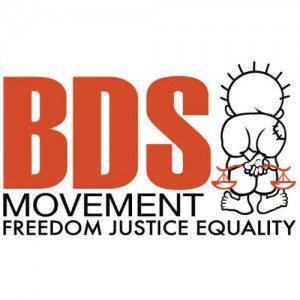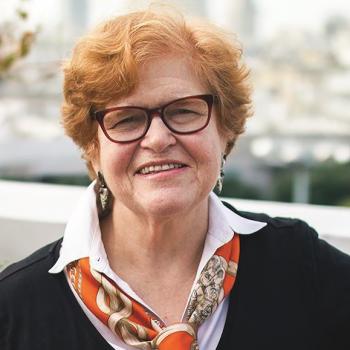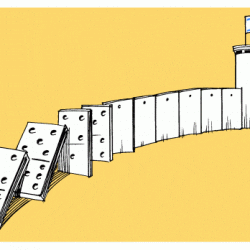This is just the beginning.
The world’s most famous living author, JK Rowling, is against it.
The world’s most famous living scientist, Stephen Hawking, is for it.
Last week 343 British academics said they were for it too.
They were joining more than a thousand British artists already signed up.
The British Government is trying to stop local authority politicians voting to do it.
And the Israeli Government is putting millions of shekels in to combating it worldwide.
The Boycott, Divestment, Sanctions movement may have been going for ten years but the support it is now attracting and the opposition that is gearing up against it, tells me something very significant is taking place.
BDS is going to be the battleground in the West where the rights and wrongs of the Palestinian/Israeli conflict will be fought out.
As Gandhi once said: “First they ignore you, then they laugh at you, then they fight you, then you win.” We have certainly reached the “fight you stage”.
But if you are a Christian and you support boycotts against Israel, then you are in particular trouble. The opposition that will line up against you will be especially formidable. There’s a long way to go before you come anywhere near winning this this argument over tactics.
By supporting BDS you will straight away place yourself well beyond what your local community and establishment hierarchy considers an acceptable form of protest.
Friends and relations will think you have become extreme in your outlook.
Vicars, priests and Bishops, who may be sympathetic to the cause of the Palestinians and even voice criticism of Israel from time to time, will decide that you have gone too far.
Very quickly you will be accused of being divisive, one-sided, morally inconsistent, naïve, anti-dialogue, anti-negotiations, and of course, anti-Semitic.
You will also be told that you are undermining decades of interfaith dialogue that has sought to repair and atone for centuries of anti-Jewish Church teaching that incited murder and mayhem across Christian Europe and paved the way for the Holocaust.
And there you were, thinking you were just standing up for someone else’s human and civil rights and applying the very ethical teaching you had been taught in Church since you were a child.
Perhaps you just though that a protest that does not involve hi-jacking planes, throwing rocks, randomly attacking people with knives, ramming cars into bus shelters or putting on explosive suicide vests, was not a bad idea.
Perhaps you have observed the following developments and decided that trying something new is worth a shot to shift the current impasse:
- After 25 years of getting nowhere, the Oslo peace process is dead and buried
- The Obama/Kerry attempt to bring it back to life got nowhere
- The occupation of the West Bank, which every Western nation says is illegal, is in its 49th year
- The Settlement building, road constructing, land grabbing, water appropriation programme continues to be protected and promoted by the Israeli government
- The Gaza blockade of air, sea and land is approaching its tenth year
- Pro-Settlement/Pro-Occupation/pro Gaza blockade politicians dominate the Israeli government
- Netanyahu’s commitment to a 2-state solution is flaky at best and non-existent in practice
- In 2014, according to UN figures, Israel killed 2,314 Palestinians in Gaza, East Jerusalem and the West Bank, including 500 children and injured a further 17,125
But no. This is what the critics will say to you:
You have it all wrong, you are just not seeing things right. It’s more complicated than you think. If you support BDS you have crossed a red line and stepped into a dangerous world of radicals and troublemakers.
Israel should not be picked on, especially when there are far worst places with appalling human rights records where you should place your attention. Have you not seen what ISIS is doing to Christian communities in the Middle-East? Have you not seen what Assad has done to the people of Syria?
According to your critics, when it comes to Israel, the world needs to carry on just as it has been for the last forty years and eventually, if everyone works a little bit harder to be friendly, and if everyone stays talking, then everything will be just fine in the Holy Land.
So if you are serious about sticking with BDS and you want to attempt to persuade your Christian friends, local Church and the senior clerical leadership to take a closer look at the situation, then you are going to need all the help you can find. (See some helpful rebuttals at the end of this post).
By the way, if you are a member of a Christian Zionist evangelical church and you have read this far down you are either badly lost or need to consider switching to a different church before you raise any of the questions and issues I’m putting forward. There’s only so much controversy you’ll be able to handle in one go!
What makes it so hard?
For Church communities with a deep connection to Jewish scripture and a sense of responsibility for Jewish suffering, adopting any kind of boycott position will be a huge ask.
For those in your local church with only a passing knowledge of the Israel/Palestine conflict, it will feel like an act of religious betrayal after all the talk of spiritual brotherhood between Jews and Christians over recent decades. You may like to remind them that Palestinian Christians are part of the broad call for boycotts that has come from Palestinian society. Examining what they have said would be a useful starting point for a discussion.
Damaging local relationships with Jewish neighbours will be another concern. Part of the difficulty is the 20th/21st century merger between modern Judaism and political Zionism. Since most Jews have a seamless identity that stitches together religion, culture, shared history and support for the Jewish State of Israel, it’s easy to see how offence will be taken and accusations of anti-Semitism will be made.
For Church leaders and individuals Christians, choosing to support some or all aspects of BDS means revisiting the entire post-Holocaust consensus around Jewish-Christian relations.
The question is, can Christians bring themselves to be seriously critical of Israel and still demonstrate that they value and respect Judaism and the Jewish people?
Can a more mature, reflective and critical Jewish-Christian relationship emerge that goes beyond the safe non-controversial space of sharing knowledge and experience of Jewish and Christian religious festivals?
At the level of Bishops and Church leaders, is the whole prospect of rocking the ecumenical boat too scary to contemplate? Is the political fall-out not worth the effort, the theological capital not worth expending?
And of course, the responsibility is not all on the side of the Church.
Will the Jewish establishment ever allow such a re-setting of relationships to take place? I suspect the answer is also ‘No’. At least not in the foreseeable future.
All of this means that re-framing the Israel/Palestine conflict through BDS is going to be an issue that starts at the grassroots and only effects change when a critical mass of support creates a politically acceptable tipping point at the top. That goes for religious and secular leaders.
So while the grassroots campaigners get on with it we will have to see if any serious soul searching begins higher up the ecclesiastical ladder.
The question for the Church leadership is: how to remake Jewish/Christian dialogue into something more honest and more theologically useful. Or does the whole interfaith project need putting on pause for a few years while both Jews and Christians get their Judaeo-Christian ethics straightened out?
10 rebuttals to BDS objectors
Meanwhile, here are a few counterpoints for Christian BDS supporters to put back to their critics:
1. I am pro talking and pro negotiation and absolutely pro peace. The question is the quality of the talking, the quality of the negotiations and whether the peace is a just one. BDS does not want to stop dialogue but it does want to create a political environment where Israel, which holds all of the cards in this dispute, knows it has to make serious concessions to maintain (or regain) global support and legitimacy.
2. I choose to focus on Israel because of the central place it has in both Christian and Jewish history. I have a connection to this part of the world through my faith and the history of the Church.
3. I don’t believe it is necessary to resolve every other conflict in the world before turning my attention to this one. There may be other regimes with worse human rights records, but Syria, for example, has no shortage of sanctions imposed on it and let me know how to boycott ISIS or Boko Haram.
4. It is because Israel is a democracy (albeit a failing one) and a country with strong economic ties to the West, that using economic and cultural boycotts is a practical tactic to use. And it is a tactic and not a religion. It makes sense in this context. There wouldn’t be much point in a cultural boycott of North Korea.
5. This is not a boycott against Jews it is a boycott against Israeli policies. If the rights of Palestinians are addressed then the boycott ends. There is all the difference in the world between the racially motivated boycott that the Nazis imposed in Germany and a campaign for political and civil rights for Palestinians.
6. Through BDS I am certainly favouring one side over the other. That’s because this is in no way a battle between equals. Being ‘fair’ does not mean expressing concern or putting pressure on both sides in equal measure. That is a theology of moral equivalence that does recognise the reality on the ground. One side has rights, one side does not. One side is the Occupier, the other side are the Occupied.
7. Universities should be places of free speech and the sharing of ideas but what happens when Universities are deeply complicit in the oppression of another people? The British pro BDS academics give plenty of examples. Can normal relationships be maintained as if no problem exists? BDS, by the way does not stop individual academics talking to each other as individuals.
8. The cultural boycott will be vital in bringing to the attention of the world the seriousness of the situation in Israel/Palestine. Our media is fixated on what celebrities do and say. Encouraging well known cultural figures to take a stand has greater impact on public perception than many small local economic boycotts. As for boycotting Israeli artists, just as with academics, the question is whether they are representing Israeli institutions which are complicit in the daily work of enforcing oppression.
9. I support small scale local initiatives that bring Israeli Jews and Palestinians together. This is worthwhile bridge building and dialogue. But if you think this is a going to bring the two sides together at a national level to conduct negotiations for a just peace you are going to be sadly disappointed. Something far more is required to break through the impasse and BDS can help to achieve that in a peaceful way.
10. I believe the oppressed have the right to resist their oppression non-violently and calling for BDS is one way to achieve that. I pray for peace but a peace that is just and not merely the absence of war.
If you found any of this useful, you may also like to read:
Boycotting from Within my Jewish response to BDS
What’s wrong with this picture? about the misuse of the Holocaust to criticise BDS

















